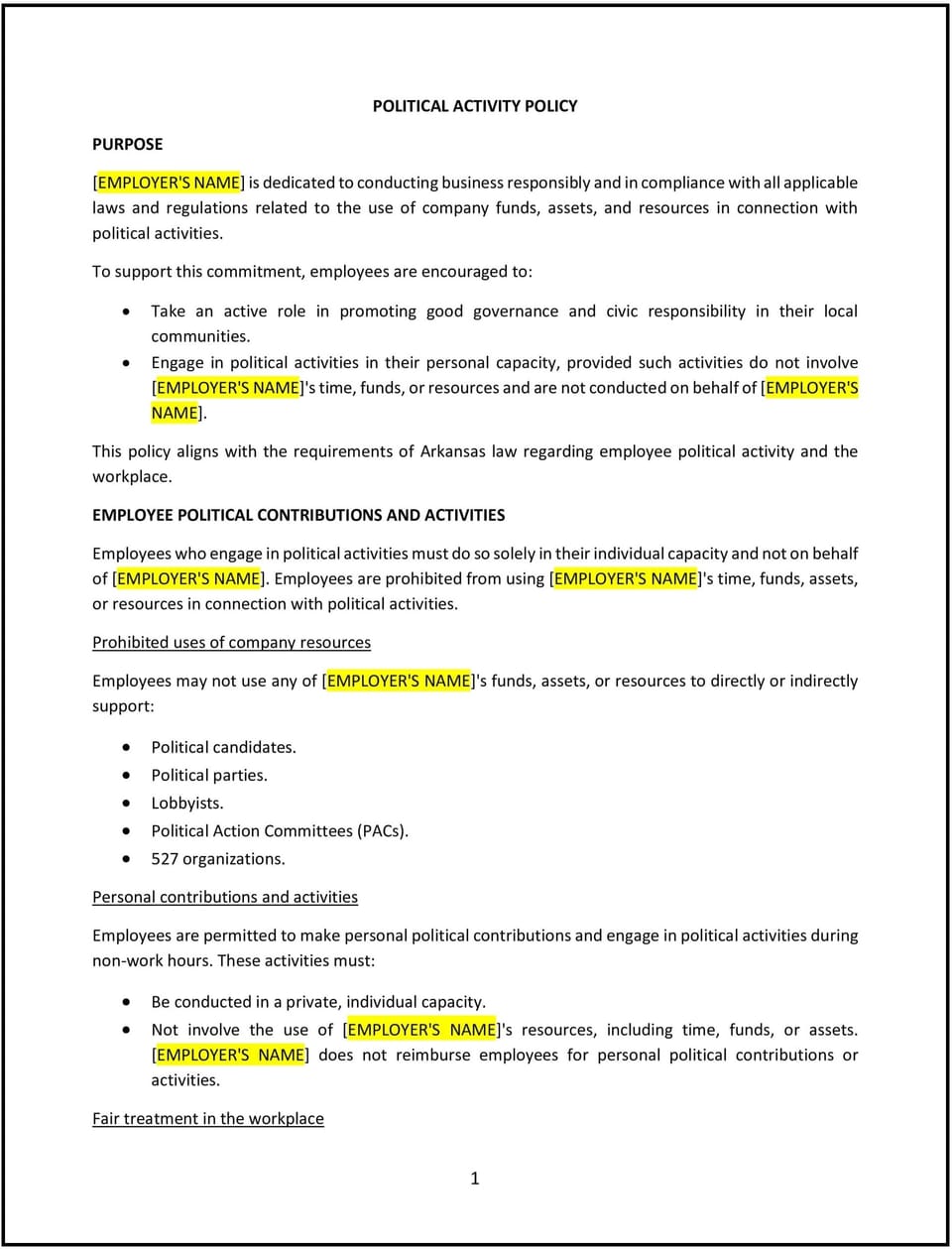Political activity policy (Arkansas): Free template

Political activity policy (Arkansas)
In Arkansas, a political activity policy provides businesses with guidelines for managing employee engagement in political activities to ensure professionalism in the workplace and avoid conflicts of interest. This policy outlines the boundaries for political expression and participation during work hours or using business resources.
By implementing this policy, Arkansas businesses can maintain a neutral and inclusive workplace, protect the business’s reputation, and support compliance with applicable labor laws while respecting employees’ rights to political participation outside work.
How to use this political activity policy (Arkansas)
- Define acceptable behavior: Clearly outline the types of political activities permitted in the workplace and any restrictions during work hours or on business premises.
- Address resource usage: Prohibit the use of business resources, such as email, phones, or office supplies, for political purposes unless explicitly approved.
- Set neutrality expectations: Communicate the importance of maintaining a politically neutral workplace to ensure inclusivity and avoid employee conflicts.
- Outline disclosure requirements: Require employees to disclose political activities that may create conflicts of interest or affect the business’s reputation.
- Enforce consistently: Apply the policy uniformly to all employees, ensuring fairness and transparency in its implementation.
Benefits of using this political activity policy (Arkansas)
This policy offers several advantages for Arkansas businesses:
- Maintains workplace neutrality: Promotes a professional and inclusive work environment, free from political bias or tension.
- Protects business reputation: Ensures employees’ political activities do not negatively impact the business’s public image.
- Supports compliance: Aligns with Arkansas and federal laws regarding employee rights and political participation in the workplace.
- Reduces conflicts: Establishes clear boundaries to prevent disputes related to political expression among employees.
- Enhances transparency: Communicates expectations clearly, ensuring all employees understand the boundaries for political activity.
Tips for using this political activity policy (Arkansas)
- Address Arkansas-specific considerations: Reflect state-specific labor laws and cultural sensitivities regarding political activities in the workplace.
- Train managers: Educate supervisors on implementing the policy fairly and addressing political activity concerns professionally.
- Encourage open communication: Allow employees to ask questions or seek clarification about the policy without fear of reprisal.
- Document disclosures: Maintain records of any disclosed political activities to ensure transparency and accountability.
- Review regularly: Update the policy to reflect changes in laws, workplace dynamics, or business needs.
Q: How does this policy benefit the business?
A: This policy helps maintain a neutral and inclusive workplace, protects the business’s reputation, and minimizes conflicts related to political activities.
Q: What political activities are restricted under this policy?
A: Employees are restricted from engaging in political activities during work hours or using business resources, such as email or office supplies, for political purposes.
Q: How does this policy support compliance with Arkansas laws?
A: The policy aligns with state and federal labor laws, ensuring employee rights are respected while protecting the business from potential legal risks.
Q: What should employees disclose regarding political activities?
A: Employees should disclose activities that could create conflicts of interest, affect workplace neutrality, or impact the business’s reputation.
Q: How can the business address violations of this policy?
A: The business should investigate potential violations, document findings, and apply appropriate disciplinary actions, such as warnings or termination, based on the severity of the issue.
This article contains general legal information and does not contain legal advice. Cobrief is not a law firm or a substitute for an attorney or law firm. The law is complex and changes often. For legal advice, please ask a lawyer.


